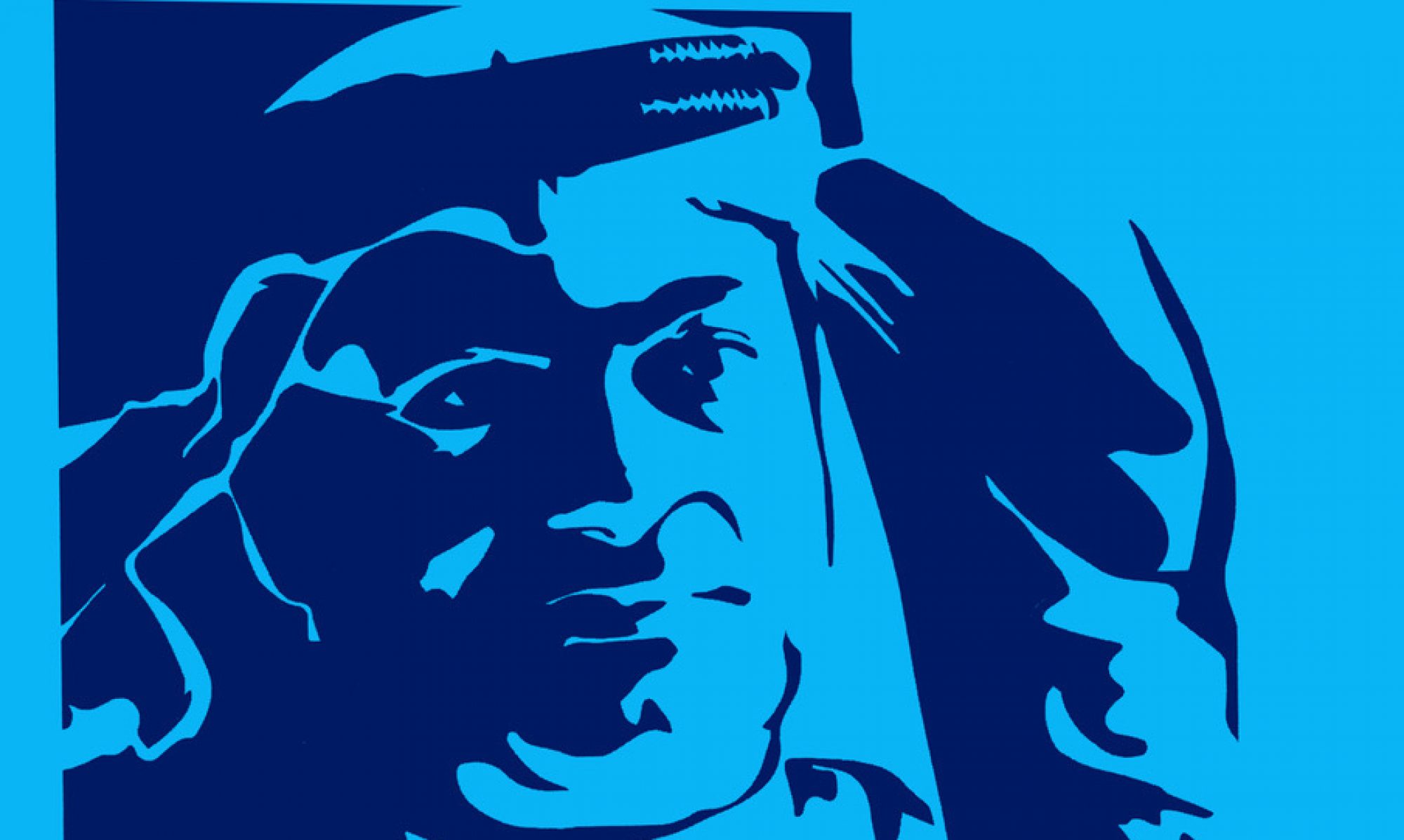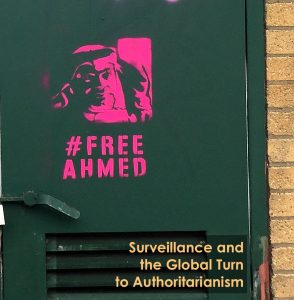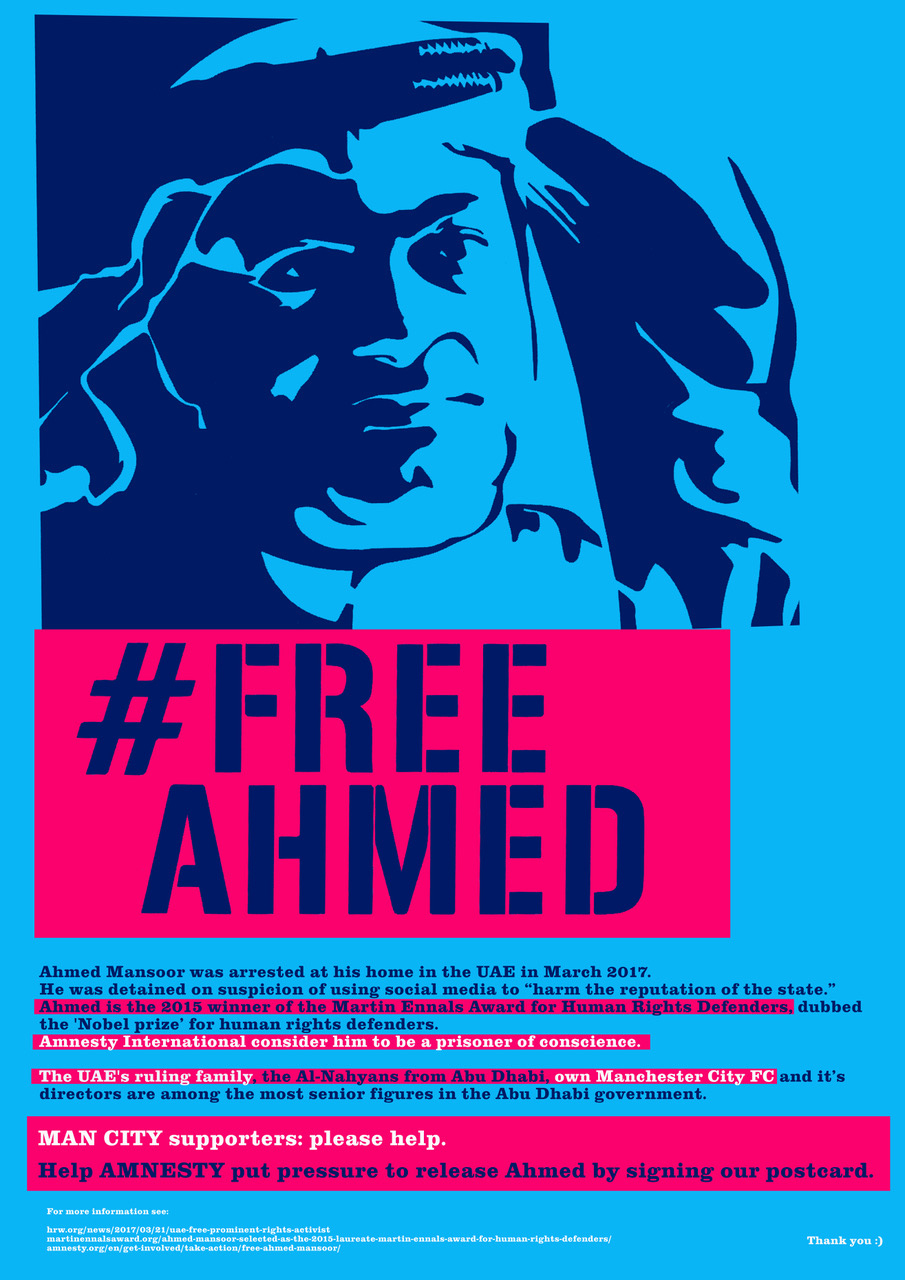Documentary film about Artur Ligęska gives first hand account of inhumane treatment of prisoners
Sing and Cry, Cry and Sing is the story of Polish fitness celebrity Artur Ligęska, who, when detained in the UAE under false charges, strikes up a friendship with his cell neighbour, Ahmed Mansoor. The film is in distribution with sixpackfilms and will be premiered at DIAGONALE 2022, Graz.
Throughout the Expo in 2022 the UAE continues its efforts to whitewash its image
CIVICUS speaks with Kristina Stockwood of the Gulf Centre for Human Rights (GCHR) about the current state of civic space in the United Arab Emirates (UAE) and the government’s efforts to improve its international reputation by holding the Expo 2020 event in Dubai.
Middle East Eye reports about Mansoor’s letter
A letter detailing Mansoor’s mistreatment in prison were published online [20 July 2021]
Exclusive to “Arabi 21”: leaked messages from UAE prisons (details)
source: https://arabi21.com/story/1372547/حصري-رسائل-مسربة-من-سجون-الإمارات-وهذه-تفاصيلها
[auto-translated ]
“Arabi 21” obtained leaked messages from inside one of the most fortified prisons in the world, one of the prisons where political detainees lie in Abu Dhabi, UAE, while the messages reveal the extent of the suffering, torture and abuse that prisoners are subjected to there.
And the leaked messages managed to get out to the outside world after they were written by the detained Emirati human rights activist Ahmed Mansoor, in which he reveals that he has been languishing in solitary confinement since his arrest in March of 2017, under strict security supervision and in light of difficult prison procedures in contravention of all human rights laws man in the world.
In the messages obtained by “Arabi 21” exclusively from its own sources, Mansour told the full story of him since his arrest, the charges brought against him, and the treatment of the Emirati judiciary and the prison administration with him, in various details.
Mansour confirms that he has been living in a solitary cell since March 15, 2017, the date of his arrest, and stated in the letters that the charges against him were initially nine, six of which were kept when referred to the judiciary.
As for the six charges brought against Mansour in secret trials, they are as follows:
1- Cooperating with a terrorist organization that aims to undermine the security and interests of the state while being aware of its purposes, in reference to the Geneva-based Al-Karama Organization for Human Rights. Mansour indicated in his leaked messages that this accusation was based on his participation on Twitter in a campaign about arbitrary detention in Saudi Arabia organized by Alkarama Organization, and that his participation consisted of a picture of him holding a paper on which it was written in Arabic and English: “Saudi Arabia from without arbitrary arrest.
He added, “An email was also found by one of Al-Karama employees asking about the case of Osama Al-Najjar and the 94, and my response to the email was that Skype would be appropriate to talk about the matter, and in the court’s ruling, it was acquitted of this charge.”
2 He created and managed his accounts on social networking sites and his e-mail and published incorrect information through them by claiming, contrary to the truth, that the UAE practices oppression and abuse against its people and abuses them and violates their rights, and this would stir up strife and hatred and disturb public order.
Mansour indicated that “this accusation is related to publishing or re-posting tweets on Twitter on topics related to human rights, such as arbitrary detention, secret prisons and some public prisons, especially Al-Razeen prison, travel bans, withdrawal of nationalities and tweets about the decline in freedom of opinion and expression in the Emirates, issuing Numerous broad laws that can be misused against activists criminalize internationally recognized rights, especially the Law on Combating Information Technology Crimes, the Terrorism Law and some articles of the Penal Code.
3- He provided the organizations identified in the investigations with incorrect information that would harm the reputation, prestige and prestige of the state.
Mansour stated that, “This accusation was based on several conferences in which he participated in Britain and Switzerland via Skype, which are (participations) published related to topics about laws and freedoms in the Emirates, the status of human rights activists in the Emirates, and nationality laws, as well as the speech he gave on the occasion of his arrest. 2015 Martin Ennals Award via Skype.
He added, “Also, some deleted email correspondences to international human rights organizations, including Amnesty International, Human Rights Watch and the Gulf Center for Human Rights, were based on issues related to human rights.”
4- Deliberately disseminates false and malicious statements and rumors that may disturb public security and harm the public interest.
5- He violated the position of judges of the Federal Supreme Court by claiming that its judiciary was unfair, and that was on the occasion of one of the cases before it, by one of the publicity methods using his accounts and information technology.
6- He published dishonestly and in bad faith by one of the public means using the aforementioned accounts and the means of information technology, what happened in the public court sessions.
Mansour pointed out in his letters that regarding these two charges, “there is no clear identification, but he suggested that these charges are related to an email about Dr. Nasser bin Ghaith that he sent to some organizations about his first appearance in court after an enforced disappearance that lasted eight months. In it, the security services interfere in the judiciary of the Federal Supreme Court, based on the report of the Special Rapporteur on the independence of judges and lawyers, who made an official visit to the UAE in 2014.
Mansour confirmed the ruling against him, and the judge imprisoned him for ten years and fined him one million Emirati dirhams (about $280,000) with a three-year probation period starting from the date of the end of the sentence imposed, in addition to confiscating communication devices used in the seized crimes, erasing phrases and closing the websites used.
Trial details
Mansour recorded in his letters, which he wrote in his handwriting, the details of the trial sessions he was subjected to in the Abu Dhabi Federal Court of Appeal or the Federal Supreme Court, and the types of violations he was subjected to.
He stated that the first court sessions actually began a year after his arrest, specifically on March 14, 2018, and that the session lasted only 3 minutes and no charges were brought against him, and the session was postponed to appoint a lawyer to defend him, although the judge agreed to Mansour’s request that He pleads for himself, and his complaints about his solitary confinement and his suffering were heard from him.
As for the second session, which also lasted 5 minutes, due to the absence of the delegated judge, Mansour reminded him of the harsh conditions of his solitary confinement, but he was not heard and the session was postponed to May 9, 2018, but was then submitted in response to the request of the delegated lawyer to April 25, 2018, in which the aforementioned charges were read out, and the prisoner’s demands related to the conditions of solitary confinement, telephone contact with relatives and family visits, were reiterated, in addition to a request to obtain a copy of the case and a copy of the laws related to this case, which he promised The judge did not implement any of them, and the case was adjourned to May 9, 2018 to discuss the prosecution witness.
In the fourth session, on May 9, 2018, a witness for the evidence attended, but Mansour indicated that before that he explained to the judge that he had not obtained the file of the case on the basis of which he is being tried and on the basis of which he would ask questions to the witness, so the judge dismissed the witness and asked the lawyer to plead, except The latter said that he would only submit a note, and submitted it to the court, even though Mansour asked him not to do so before he saw it and the case file.
At the fourth session, the matter ended with the case being reserved for judgment on May 29, 2018, with a recommendation to inform the accused of the case or give him a copy of it, noting that he did not obtain a copy of the case, but rather reviewed it in the prosecution, and accordingly sent a defense memorandum to the Public Prosecution Office without his memorandum having any effect on the proceedings.
Regarding the second court sessions, related to the Federal Supreme Court (the Court of Cassation), Mansour stated that it started its first session on October 29, 2018, and was headed by Judge Falah Al-Hajri, an Emirati, in which Mansour also presented the harsh conditions of his solitary confinement, and demanded that he be granted prisoner rights The reserve is in addition to the rest of the previous demands, foremost of which is the right to obtain a copy of the case, before the hearing is adjourned to November 12, 2018.
He pointed out that the second session of the Court of Cassation sessions presented various previous cases related to prison conditions and his right to obtain a copy of the case, in addition to the prison administration preventing him from taking a memorandum he prepared to defend himself, and the case was postponed to November 26, 2018. , but it was also postponed to December 10, 2018, in which he submitted two defense memoranda, and the court decided to reserve the hearing for judgment to December 24, 2018, but the court also postponed it without the defendant’s knowledge until December 31. 2018, in which the court rejected the appeal submitted by the prosecution and the accused.
Detention conditions
Mansour revealed the circumstances of his arrest, stressing that since he entered prison on March 21, 2017, he is being held in solitary confinement, and that the isolation was more severe in the first two and a half years, and that he could not talk to any prisoner even from a distance.
He stated that on December 14, 2017, he returned to his cell from the investigation late, and was surprised that the prison administration entered his cell and confiscated all his underwear and outerwear, and left him only a sports shirt after cutting his long sleeves, and also confiscated the mattress on which he slept and all the toiletries. The character included soap, shampoo, toothpaste and deodorant. She also confiscated all 4 towels he owned, leaving only one for him, and also confiscated papers and pens in his possession, before also cutting him hot water in the winter.
He pointed out that this situation caused him many health problems, including high blood pressure, and several severe colds.
He added: “After the verdict was issued (or more correctly pronounced) on May 29, 2018, two days a paper was hung on the gate of my cell that read: It is strictly forbidden to leave the cell except in an emergency or security orders to review the Security Information Branch.. From calling or visiting unless with the approval of the director of the department or the deputy director of the department.
He confirmed that this paper remained on every cell he passed through until July 2019, noting that the decision to confiscate his personal belongings was due to his refusal to give the security services the password to his private account on Twitter.
Two hunger strikes
Mansour drew attention to the fact that he fought two hunger strikes in defense of his rights as a prisoner, after all legal and natural methods failed to do so, and that he fought the first strike from March 17, 2019 to April 10, 2019, and that he lost 8.5 kg of his body weight.
LETTER: Dear Andy Burnham, name a street in Manchester after Ahmed Mansoor
Andy Burnham
Mayor of Greater Manchester
Manchester, UK
the.mayor@greatermanchester-ca.gov.uk
31 May 2018
Dear Mayor Burnham,
The undersigned organisations are writing to you to request your support for the release of the award-winning Emirati human rights defender Ahmed Mansoor, sentenced this week to ten years in prison for his human rights activism. We believe that this will be facilitated by raising awareness of his case by naming a street after him in Manchester.
Ahmed Mansoor is a pro-democracy and human rights campaigner who has publicly expressed criticism of serious human rights violations in the United Arab Emirates (UAE).
Mansoor was sentenced to ten years in prison by the State Security Court in Abu Dhabi on 29 May 2018 for “insulting the status and prestige of the UAE and its symbols”, including its leaders, as well as of “seeking to damage the relationship of the UAE with its neighbours by publishing false reports and information on social media.”
Mansoor is the 2015 Laureate of the Martin Ennals Award for Human Rights Defenders, and a member of the Gulf Centre for Human Rights (GCHR) Advisory Board and Human Rights Watch’s Middle East Advisory Committee. Amnesty International considers him to be a prisoner of conscience, imprisoned solely for exercising his right to freedom of expression, who should be immediately and unconditionally released. There are concerns that Mansoor has been tortured in pre-trial detention that lasted more than one year.
On 20 March 2017, about a dozen Emirati security officers arrested him at his home in
Ajman in the early hours of the morning. The UAE’s official news agency, WAM, claimed that Mansoor had been arrested on the orders of the Public Prosecution for Cybercrimes,
detained pending further investigation, and that he was accused of using social media websites to: “publish false information and rumours;” “promote [a] sectarian and hate-incited agenda;” and “publish false and misleading information that harms national unity and social harmony and damages the country’s reputation.”
Human rights groups are banned in the UAE and people in the UAE who speak out about human rights abuses are at serious risk of arbitrary detention, imprisonment, and torture and other ill-treatment. Many such people are serving long prison terms or have felt they have no choice but to leave the country.
Before his arrest, Mansoor was the last remaining human rights defender in the UAE who had been in a position to criticise the authorities’ human rights record publicly.
As you are aware, Manchester City Council has developed close commercial links with senior figures in the UAE government, via its stake in the Manchester Life Development Company (MLDC), a joint venture ultimately controlled by the Abu Dhabi United Group for Investment and Development (ADUG). ADUG is owned and controlled by the Abu Dhabi Executive Affairs Authority, whose chair is Mohamed bin Zayed Al-Nahyan, the de facto ruler of the UAE. In addition, Manchester City FC is owned by the deputy Prime Minister of the UAE, Sheikh Mansour bin Zayed Al Nahyan.
While Abu Dhabi’s investments may have brought financial benefits to Manchester, this should not preclude criticism of human rights violations in UAE – violations which are starkly at odds with the values and principles that Greater Manchester celebrates as part of its heritage. In recent years, Senior members of Manchester City Council have celebrated Manchester’s long history of standing up for a range of rights-related causes, including the anti-slavery movement, votes for women, and pro-democracy demonstrations in Manchester in 1819. But they have apparently shied away from criticising human rights violations by the UAE and Abu Dhabi authorities with whom their commercial partners are linked.
We support the local residents who are part of the “Ahmed Mansoor Street” campaign, who argued it would be “a fitting honour to bestow upon an individual who embodies so many of the qualities that the city and the wider region celebrates as a key part of its history.”
As the first directly-elected Mayor of Greater Manchester you are in a unique position to show leadership on this issue. In your manifesto for the Mayoralty you referred to Greater Manchester as “the home of radical forward thinking” and expressed your desire to make it “a beacon of social justice for the country.” Your public support for a street named after Ahmed Mansoor, and calling for his immediate and unconditional release, would demonstrate your commitment to this heritage and these ideals.
Signed,
- Adil Soz
- Americans for Democracy & Human Rights in Bahrain (ADHRB)
- Amnesty International
- Arabic Network for Human Rights Information (ANHRI)
- Association for Freedom of Thought and Expression (AFTE)
- Asociación Mundial de Radios Comunitarias América Latina y el Caribe (AMARC ALC)
- Bahrain Institute for Rights and Democracy (BIRD)
- Bytes For All
- Cairo Institute for Human Rights Studies (CIHRS)
- Cartoonists Rights Network International (CRNI)
- CIVICUS
- European Centre for Democracy and Human Rights (ECDHR)
- FIDH, within the framework of the Observatory for the Protection of Human Rights Defenders
- Freedom Forum, Nepal
- Free Media Movement, Sri Lanka
- Front Line Defenders
- Gulf Centre for Human Rights (GCHR)
- Human Rights Watch
- Index on Censorship
- International Press Centre, Nigeria
- International Service for Human Rights (ISHR)
- Maharat Foundation
- Martin Ennals Foundation
- National Union of Somali Journalists (NUSOJ)
- Palestinian Center for Development and Media Freedoms (MADA)
- PEN Canada
- Reporters Without Borders (RSF)
- South East Europe Media Organization
- Syrian Centre For Media And Freedom Of Expression
- Vigilance for Democracy and the Civic State, Tunisia
- World Organisation Against Torture (OMCT), within the framework of the Observatory for the Protection of Human Rights Defenders
Note to supporters and media: The street-naming campaign event will take place on 01 June 2018 at 2pm on Thomas Street in the Northern Quarter.
The Guardian: Manchester campaigners want street named after Emirati activist
Sheikh Mansour with Manchester City player Pablo Zabaleta and manager Pep Guardiola at a training camp in Abu Dhabi in February last year. Photograph: Victoria Haydn/Manchester City FC via Getty Images
Council criticised for failing to put pressure on UAE to improve human rights record
A group of Manchester residents has launched a campaign to name a new street after a jailed Emirati human rights activist in a bid to highlight human rights abuses by the United Arab Emirates, which has invested billions of pounds in the city and its title-winning football club.
Ahmed Mansoor was arrested after a dozen Emirati security officers stormed his home in Ajman in the early hours of 20 March 2017. The UAE’s official news agency, WAM, claimed Mansoor had been detained for using social media to “publish false and misleading information” that would harm national unity and the country’s reputation.
The Abu Dhabi United group, owned by Sheikh Mansour bin Zayed al-Nahyan, the country’s deputy prime minister and member of the ruling royal family, entered a £1bn housing deal with Manchester city council in 2014, six years after it bought Manchester City football club. Campaigners have criticised the city’s authorities for failing to use their influence to put pressure on the country to improve its human rights record.
In a letter from campaigners calling on the city’s councillors, the mayor of Greater Manchester, Andy Burnham, and the MP for Manchester Central, Lucy Powell, to back the “Ahmed Mansoor St’ campaign, the group argued it would be “a fitting honour to bestow upon an individual who embodies so many of the qualities that the city and the wider region celebrates as a key part of its history”.
The leader of Manchester city council, Richard Leese, responded to the letter from the group, saying: “Street naming is not my department, but long-standing policy is to not name streets after anybody still living or with no connection to the city.”
Lucy Powell responded to the group saying that she had written to the council asking it to consider the proposal.
In their letter, campaigners acknowledged that this was council policy, but called on councillors to back an amendment to that rule. In April 2017, Manchester City FC named a street outside the club’s Ethihad stadium after the former council chief executive Howard Bernstein, who facilitated the UAE’s investment in Manchester. Sir Howard Bernstein Way is a private street and so not subject to council rules on street naming.
In the letter to councillors, the group said: “We believe that Manchester could and should stand in support of outstanding individuals who are being subjected to serious human rights abuses as a direct result of principled stances on issues that Manchester celebrates as part of its heritage, especially when there is a clear link to the city.
“Trade and investment are important, but, as its history demonstrates, Manchester has always used new relations with different parts of the world to argue for the values of human rights and dignity that are so important to many in the city.”
Since Mansoor’s arrest a year ago, the Manchester Amnesty International group has been staging monthly vigils outside the council’s chambers to raise awareness of his situation. It is thought he is being held in solitary confinement and has not seen a lawyer.
Last month, a report by Dr Jonathan Silver of the University of Sheffield, commissioned by Greater Manchester Housing Action, found that none of the 15,000 recently built homes in Manchester city centre was classed as “affordable”.
“As the city becomes re-established in new global networks of finance and trade the people of Manchester will want to know that these international relations are predicated not just on a focus on investment,” said Silver, one of the letter’s signatories.
“Rather, drawing on our history of solidarity and radical action alongside recognition of the important role (both positive and negative) the city has played in global history, issues of human rights must be at the fore of these new relations. To be an international city is not just about how many millions of pounds are flowing in but how we remain true to our shared ideals of respect, dignity and justice.”
Frances Perraudin North of England reporter
Surveillance and the Global Turn to Authoritarianism
article: surveillance and society
Free Ahmed Poster
Ahmed Masnoor was arrested at his home in the UAE in March 2017.
He was detained on suspicion of using social media to “harm the reputation of the state.”
Ahmed is the 2015 winner to of the Martin Ennals Award for Human Rights Defenders, dubbed the “Nobel prize” for human rights defenders.
Amnesty International consider him to be a prisoner of consience.
The UAE’s ruling family, the Al-Nahyans from Abu Dhabi, own Manchester City FC and it’s directors are among the most senior figures in the Abu Dhabi government.
MAN CITY supporters: please help.
Help AMNESTY put pressure to release Ahmed by signing our postcard.
For more information see:
https://www.hrw.org/news/2017/03/21/uae-free-prominent-rights-activist
http://www.martinennalsaward.org/ahmed-mansoor-selected-as-the-2015-laureate-martin-ennals-award-for-human-rights-defenders/
https://www.amnesty.org/en/get-involved/take-action/free-ahmed-mansoor/



